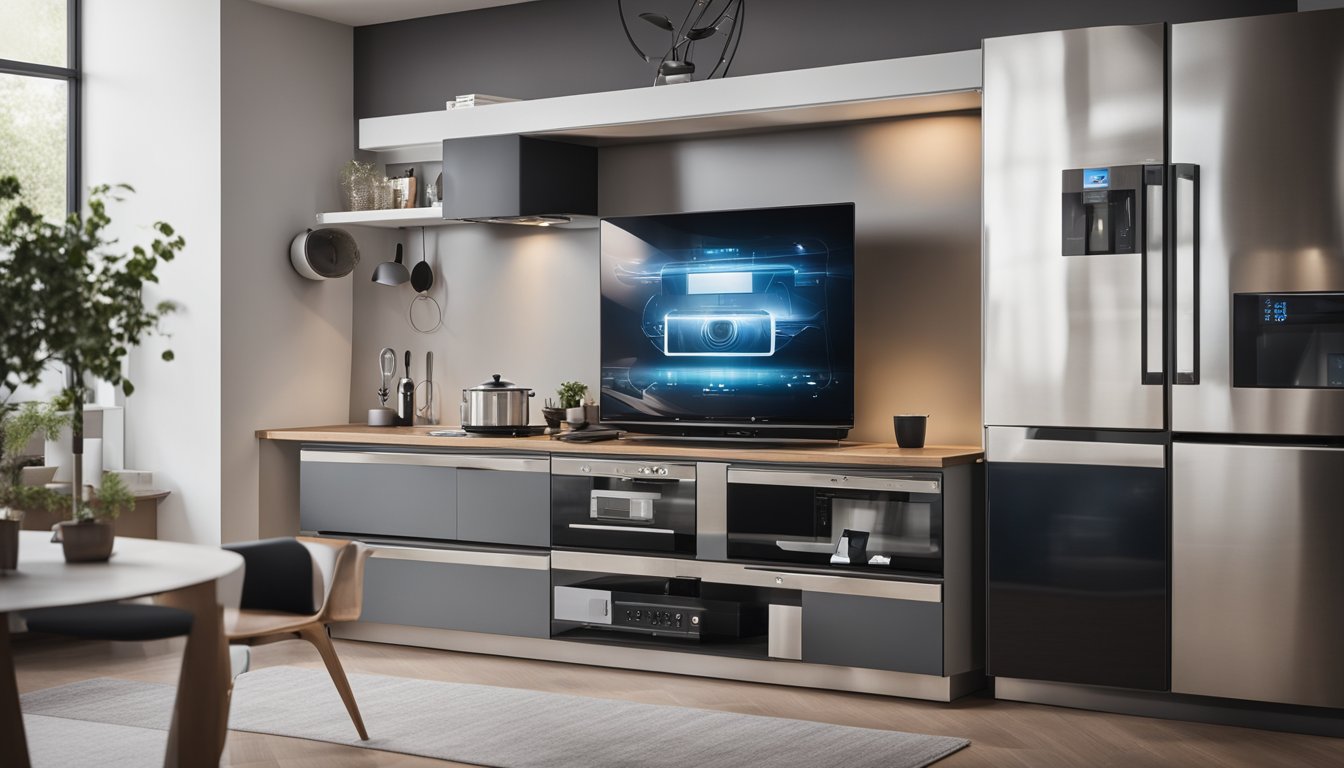Late updated: 19 Sep 2024 11:09
Written by: Eleanor Hartman
5G Network Impact On Home Energy Efficiency In The UK: Transforming Residential Consumption
The transformative potential of 5G in the UK is vast, not just for digital connectivity but also for enhancing home energy efficiency. As we integrate this advanced network within our lives, a critical focus is how 5G can support greener energy solutions. 5G technology can significantly reduce the carbon footprint of home energy systems by enabling smarter energy management and more efficient electricity distribution.

Our interconnected world relies increasingly on Information and Communication Technology (ICT) to deliver efficient solutions to environmental challenges. With 5G, we can optimise energy consumption in ways previously unattainable, thereby supporting the UK's goals for sustainability and reduced carbon emissions. Exploring the intersection of 5G and energy efficiency reveals promising avenues for innovation and environmental stewardship.
By examining how 5G network advancements can lead to enhanced environmental outcomes, we unlock insights into smarter, sustainable living. The network not only promises faster internet speeds but also plays a pivotal role in promoting energy efficiency in our homes.
Key Takeaways
- 5G reduces home energy carbon footprint.
- ICT enables smarter energy solutions.
- Connection of 5G and environmental sustainability.
Exploring 5G and Its Advancements in ICT

5G networks are reshaping the telecommunications landscape with enhanced bandwidth and spectrum efficiency. As we transition from LTE to anticipations of 6G, 5G is setting new standards in data rate and IoT connectivity. The technology behind 5G offers significant technological advancements that drive both efficiency and capacity.
From LTE to 5G: Evolution of Mobile Networks
The journey from LTE to 5G represents a major shift in mobile networks. LTE, or Long-Term Evolution, provided substantial improvements in data speed and capacity. Yet, 5G surpasses its predecessor due to its ability to handle increased network traffic and improved spectrum efficiency.
With 5G, we see advancements like Massive MIMO (Multiple Input Multiple Output), which allows for greater data throughput and reliability. This advancement elevates the performance of wireless systems, enabling smoother connections and supporting a significantly higher number of devices.
5G Technology: Enhancements and Capabilities
5G technology is characterised by impressive enhancements in data rate and low latency, making it pivotal for IoT applications. The increased bandwidth supports new services and a multitude of devices connected simultaneously without compromising performance.
Its capabilities pave the way for advancements in areas such as telemedicine, smart cities, and autonomous vehicles. The low latency of 5G facilitates real-time communication, crucial for emerging technologies reliant on quick data exchanges to function effectively.
Anticipating 6G: The Future Beyond 5G
While 5G is still in the process of widespread adoption, the telecommunications industry is beginning to look towards 6G. We expect 6G to incorporate even higher data rates, potentially reaching the terabit per second range. This will likely enhance Virtual and Augmented Reality experiences and expand IoT possibilities further.
Potential features of 6G might include extremely low latency and the ability to intelligently manage network traffic to prioritise critical communications. With 6G, we anticipate improved energy efficiency and greater integration with AI, leading to smarter, more responsive networks.
5G's Role in Energy Efficiency and Environmental Sustainability
5G technology offers a transformative potential in boosting energy efficiency and promoting environmental sustainability. By reducing power consumption and carbon emissions, it enhances network energy performance and promises a more sustainable future. Our exploration reveals the specific impacts on home energy, network densification, and the pursuit of greener solutions.
Impact on Home Energy Consumption
Energy consumption in homes is significantly influenced by the efficiency of network technologies. 5G offers improved energy-efficiency by using less power than previous networks. Its enhanced speed and reliability mean devices can complete tasks quicker, reducing the time spent using energy-hungry connections.
In the UK, smart home devices now often operate on 5G. This can lead to energy savings, as real-time data enables smarter energy usage, such as optimising heating and appliance usage according to demand. A key benefit lies in its reduced energy consumption per bit of data transmitted, leading to less overall power use. This not only trims household emissions but also supports a more environmentally-friendly lifestyle.
Network Densification and Its Effect on Energy Performance
As we transition to 5G, network densification becomes necessary. This involves deploying a larger number of small cell sites, which may seem counterintuitive for efficiency. Yet, these sites consume less power individually compared to traditional larger 4G towers. 5G cell towers are notably more energy-efficient, requiring less energy to provide equivalent, if not superior, coverage and data processing capabilities.
Through lower energy consumption for transmitting data, 5G contributes to reduced carbon emissions. This densification process enables closer proximity to users, improving network performance and reducing latency. The implications for energy performance reflect not merely in improved communications but also in substantial environmental benefits, contributing to a sustainable future.
Achieving a Greener Future Through 5G-Enabled Solutions
The role of 5G extends beyond energy savings in networks and homes to enabling smarter solutions across various sectors. This includes integration with renewable energy sources, optimising energy grids, and offering real-time data analytics to manage resources efficiently.
5G powers smart cities, enhancing traffic management, reducing congestion, and enabling efficient public transport systems. These solutions cut down on carbon emissions and power consumption. By facilitating advancements such as remote work and telemedicine, the need for commuting and travel reductions further supports a greener future.
Through improved connectivity and efficiency, 5G is an enabling force towards environmental sustainability, a crucial component in our collective stride towards an eco-friendly and sustainable future.
Frequently Asked Questions

As we explore the implications of 5G technology on home energy efficiency in the UK, several questions arise regarding its impact and potential benefits. We will address key areas such as energy efficiency enhancements, carbon footprint reduction, and energy-saving contributions.
How will the rollout of 5G enhance energy efficiency in UK households?
5G technology promises to revolutionise energy management in homes by supporting advanced smart grid applications. This will enable detailed real-time monitoring and adjustments in energy usage, potentially leading to significant reductions in waste.
What evidence exists to support the effect of 5G on home energy consumption in the UK?
Studies and trials are underway to quantify 5G's impact on energy consumption. Early evidence suggests that homes equipped with 5G-driven smart devices may see improved energy management, although comprehensive data across various demographics is still being collected.
Can 5G technologies reduce the carbon footprint of British homes?
By enabling more efficient energy usage and integration of renewable energy sources, 5G can play a role in reducing carbon emissions. Optimised device control and smart energy applications could lead to decreased reliance on non-renewable resources.
What are the potential benefits of 5G for smart homes in the UK?
5G will enhance smart home capabilities by facilitating faster and more reliable connections between devices. This will support advanced automation, energy management systems, and improved security features, leading to a more efficient and responsive home environment.
To what extent can 5G contribute to the UK's energy-saving goals in residential areas?
5G could significantly contribute to national energy-saving targets by promoting efficient electricity consumption and enabling better integration of renewable sources. This requires widespread adoption and investment in supporting infrastructure to fully realise its potential.
How does the energy usage of 5G compare to previous mobile networks in the context of UK housing?
While 5G infrastructure itself may require more energy initially, its efficiency in data transmission and support for low-energy devices is expected to offset this. Over time, it can provide a net positive impact on energy consumption compared to older technologies when utilised effectively in housing management systems.